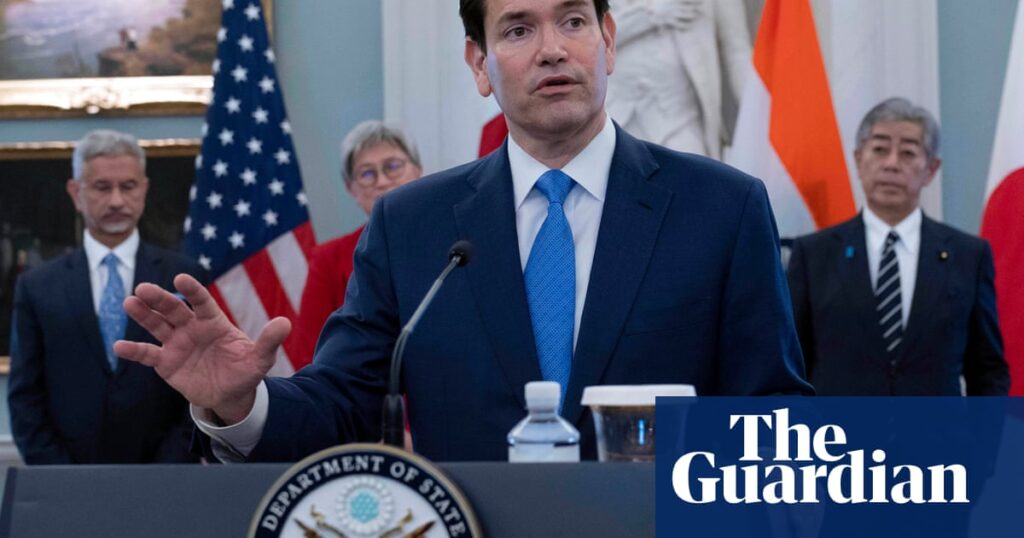
The United States, Japan, India, and Australia have pledged to collaborate on ensuring a stable supply of critical minerals, amidst growing concerns over China’s dominance in resources essential for new technologies. The four nations announced the establishment of the Quad Critical Minerals Initiative, aimed at “collaborating on securing and diversifying” supply chains.
While the joint statement offered limited details, the underlying goal was clear: reduce reliance on China, which has historically used resource restrictions as leverage. This move comes as the United States imposes curbs on China’s access to semiconductors and threatens steep tariffs. Notably, China holds significant reserves of several key minerals, including the majority of the world’s graphite, crucial for electric vehicles.
Strategic Shift in Focus
US Secretary of State Marco Rubio welcomed his counterparts from the Quad grouping to Washington, marking a strategic shift towards Asia. Rubio, who has spent much of his initial tenure addressing conflicts in Ukraine and the Middle East, emphasized the importance of diversifying supply chains and expressed a desire for “real progress.”
In their joint statement, the Quad countries underscored the risks of relying on a single nation for processing and refining critical minerals. They warned that such dependency could lead to “economic coercion, price manipulation, and supply chain disruptions.”
“Reliance on any one country for processing and refining critical minerals and derivative goods production exposes our industries to economic coercion, price manipulation and supply chain disruptions,” the statement read.
Geopolitical Tensions and Regional Stability
While the ministers avoided directly naming China, they voiced “serious concerns regarding dangerous and provocative actions” in the South China Sea and East China Sea, which they claimed threaten regional peace and stability. This development follows a period where China has not been the primary focus of the Trump administration, despite initial expectations.
President Donald Trump, who has spoken respectfully of Chinese President Xi Jinping, has sought to ease tensions in the broader trade war between the world’s two largest economies. However, Trump is expected to attend a Quad summit in India later this year, potentially signaling a renewed focus on Asia.
Focus on a Free and Open Indo-Pacific
Both the Indian and Japanese foreign ministers expressed a desire for the Quad to concentrate on maintaining a “free and open Indo-Pacific,” a phrase often used to counter Chinese influence in Asia. Indian Foreign Minister Subrahmanyam Jaishankar emphasized the importance of freedom of choice for Indo-Pacific nations in making development and security decisions.
“It is essential that nations of the Indo-Pacific have the freedom of choice, so essential to make right decisions on development and security,” Jaishankar stated.
Broader Security Concerns
At Jaishankar’s urging, the Quad condemned a May attack on the Indian side of Kashmir that resulted in the deaths of mostly Hindu civilians. The group called for the perpetrators to be brought to justice promptly. Additionally, in a move addressing Japan’s concerns, the Quad condemned North Korea’s “destabilising launches” of missiles and insisted on its “complete denuclearisation.”
Despite common ground on the issue of China, the Quad members have shown differences on other global hotspots. The joint statement notably omitted mentions of Ukraine or Iran. India has maintained its longstanding relationship with Russia despite the invasion of Ukraine, while both India and Japan have historically enjoyed cordial ties with Iran.
Implications and Future Steps
The Quad’s initiative to diversify critical mineral supplies represents a significant step in reducing dependency on China and enhancing regional security. As global demand for these minerals continues to rise, the collaboration could pave the way for more resilient and diversified supply chains.
Looking ahead, the Quad nations will likely continue to balance their strategic interests with the need for cooperation on broader global issues. The upcoming Quad summit in India may further define the group’s approach to addressing regional challenges and reinforcing their commitment to a stable and open Indo-Pacific.





